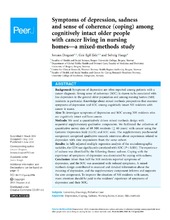| dc.contributor.author | Drageset, Jorunn | en_US |
| dc.contributor.author | Eide, Geir Egil | en_US |
| dc.contributor.author | Hauge, Solveig | en_US |
| dc.date.accessioned | 2017-05-04T11:52:06Z | |
| dc.date.available | 2017-05-04T11:52:06Z | |
| dc.date.issued | 2016-06-09 | |
| dc.Published | Drageset J, Eide GE, Hauge S. Symptoms of depression, sadness and sense of coherence (coping) among cognitively intact older people with cancer living in nursing homes—a mixed-methods study. PeerJ. 2016;4:e2096 | eng |
| dc.identifier.issn | 2167-8359 | |
| dc.identifier.uri | https://hdl.handle.net/1956/15777 | |
| dc.description.abstract | Background: Symptoms of depression are often reported among patients with a cancer diagnosis. Strong sense of coherence (SOC) is shown to be associated with less depression in the general older population and among nursing homes (NH) residents in particular. Knowledge about mixed-methods perspectives that examine symptoms of depression and SOC among cognitively intact NH residents with cancer is scarce. Aim: To investigate symptoms of depression and SOC among NH residents who are cognitively intact and have cancer. Methods: We used a quantitatively driven mixed-methods design with sequential supplementary qualitative components. We facilitated the collection of quantitative survey data of 60 NH residents ( 65 years) with cancer using the Geriatric Depression Scale (GDS) and SOC scale. The supplementary psychosocial component comprised qualitative research interviews about experiences related to depression with nine respondents from the same cohort. Results: In fully adjusted multiple regression analysis of the sociodemographic variables, the GDS was significantly correlated with SOC (P < 0.001). The experience of sadness was identified by the following theme: sadness. Coping with the experience of symptoms of depression was dominated by coping with sadness. Conclusion: More than half the NH residents reported symptoms of depression, and the SOC was associated with reduced symptoms. A mixedmethods design contributed to nuanced and detailed information about the meaning of depression, and the supplementary component informs and supports the core component. To improve the situation of NH residents with cancer, more attention should be paid to the residents’ experience of symptoms of depression and their SOC. | en_US |
| dc.language.iso | eng | eng |
| dc.publisher | PeerJ | eng |
| dc.rights | Attribution CC BY | eng |
| dc.rights.uri | http://creativecommons.org/licenses/by/4.0 | eng |
| dc.subject | Depression | eng |
| dc.subject | Coping | eng |
| dc.subject | Sadness | eng |
| dc.subject | Nursing home | eng |
| dc.subject | Cancer | eng |
| dc.subject | Mix-methods | eng |
| dc.title | Symptoms of depression, sadness and sense of coherence (coping) among cognitively intact older people with cancer living in nursing homes—a mixed-methods study. | en_US |
| dc.type | Peer reviewed | |
| dc.type | Journal article | |
| dc.date.updated | 2017-02-10T08:12:03Z | |
| dc.description.version | publishedVersion | en_US |
| dc.rights.holder | Copyright 2016 The Author(s) | |
| dc.identifier.doi | https://doi.org/10.7717/peerj.2096 | |
| dc.identifier.cristin | 1372520 | |
| dc.source.journal | PeerJ | |

